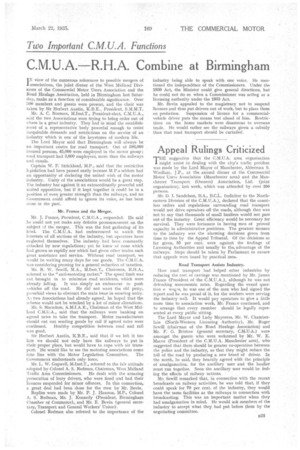C.M.U.A.—R.H.A. Combine at Birmingham
Page 37

If you've noticed an error in this article please click here to report it so we can fix it.
IN view of the numerous references to possible mergers of 1 associations, the joint dinner of the' West Midland Divisions of the Commercial Motor Users Association and the Road Haulage Association, held in Birmingham last Saturday, ranks as a function of considerable significance. Over ::;00 members and guests were present, and the chair was taken by Sir Herbert Austin, K.B.E., President, S.M.M.T.
Mr. A. C. Norman, M.Inst.T., President-elect, C.M.U.A., said the two Associations were trying to bring order out of chaos in a great industry. They had in mind the establishment of a representative body powerful enough to resist inequitable demands and restrictions on the service of an industry which is one of the keystones of modern life.
The Lord Mayor said that Birmingham will always be an important centre for road transport. Out of 380,000 insured persons, 45,000 were employed in the motor group ; road transport had 3,000 employees, more than the railways and canals.
Captain W. F. Strickland, M.P., said that the restrictive legislation had been passed easily because M.P.s seldom had an opportunity of declaring the united wish of the motor industry. Unity of the associations would be a great step. The industry has against it an extraordinarily powerful arid united opposition, but if it kept together it could be in a position of even 'greater strength than the railways, and no Government could afford to ignore its voice, as has been done in the past.
. Mr. France and the Merger.
Mr. j. France, President, C.M.U.A., responded. He said he could not yet make any definite pronouncement on the subject of the merger. This was the first gathering of its kind. The C.M.U.A. had endeavoured to watch the interests of all sections of the industry, hut operators have neglected themselves. The industry had been constantly attacked by new regulations; yet he knew of none which had grown so rapidly nor which had given other trades such great assistance and service. Without road transport, we would be waiting many days for our goods. The C.M.U.A. was considering pressing for a general reduction of taxation.
Mr. R. W. Sewill, M.A., M.Inst.T., Chairman, R.H.A.; referred to the ''anti-motoring racket." The speed limit was not brought in to minimize road accidents, which were
already falling. It was simply an endeavour to push vehicles off the road. He did not want the old petty, parochial views to obstruct the main issue in securing unity. A 3 two Associations had already agreed, he hoped that the scheme would not be wrecked by a lot of minor alterations.
Mr. S. Macadam, Chairman of the West Midland C.M.U.A., said that the railways were banking on agreed rates to take the transport. Motor manufacturers should cut out sending goods by rail if agreed rates were continued. Healthy competition between road and rail was good.
Sir Herbert Austin, K.B.E., said that if we left it too late we should not only have the railways to put in their proper place, but would have to cope with air transport. 'He would like to see the motoring associations come into line with the Motor Legislation Committee. The Government understands only force.
Mr. L. W. Gupwell, M.Inst.T., referred to the fair attitude adopted by Colonel A. S. Redman, Chairman, West Midland Traffic Area Commissioners. He dealt with the amazing persecution of lorry drivers, who were fined and had their licences-suspended for minor offences. In this connection, a great deal had been done for the men by Mr. Bevin..
Replies were made by Mr. P. J. Hannon, M.P., Colonel A. S. Redman, Mr. J. Kennedy (President, Birmingham Chamber of Commerce),, and Mr. E. Bevin (general secretary, Transport and General Workers' Union).
Colonel Redman also referred to the importance of the industry being able to speak with one voice. He mentioned the independence of the Commissioners. Under the 1930 Act, the Minister could give general directions, but he could not do so when a Commissioner was acting as a licensing authority under the 1933 Act.
Mr. Bevin appealed to the magistracy not to suspend licences and thus put drivers out of work, but to place them on probation. Suspension of licence for a commercialvehicle driver puts the means test ahead of him. Restrictions on the home markets were disastrous to overseas trade. He would rather, see the railways given a subsidy than that road transport should be curtailed.




























































































